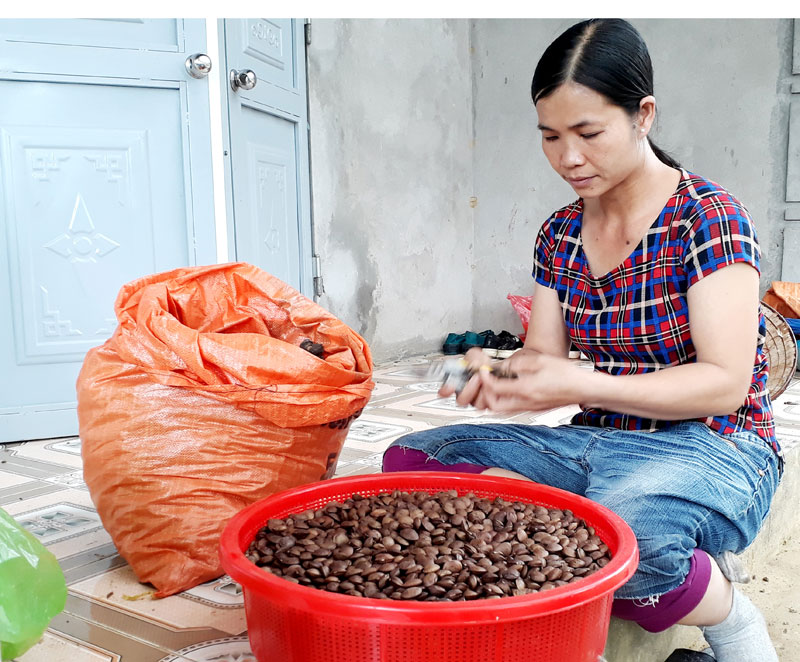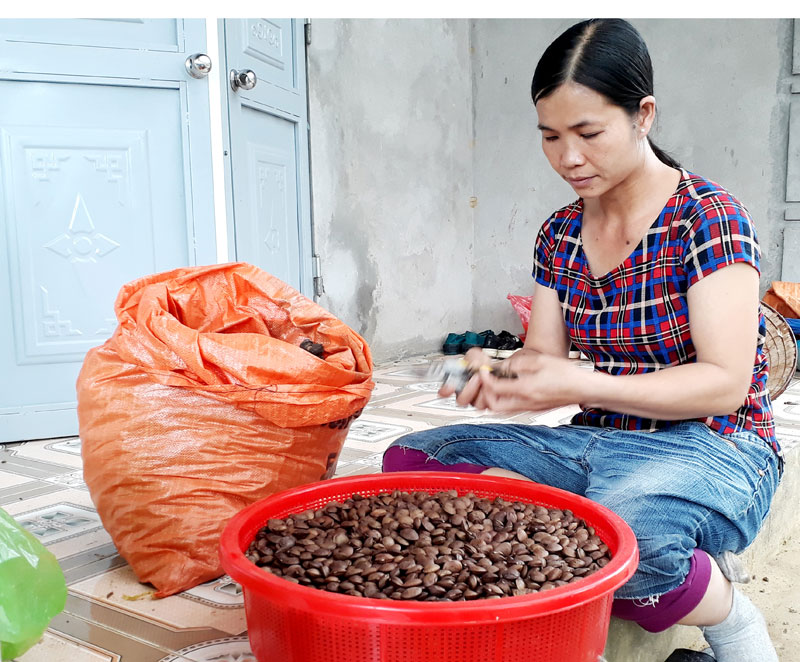
(HBO) – In 2017, Inca Vietnam joint Stock Company tested a model planting Sachi at Bua Lay of Khang hamlet, Dich Giao commune (Tan Lac district). Now, Sachi has already and is developing very well and meets the demand stably. This plant is giving the high performance of efficiency and opens direction of the potential development.

Ms. Thi Hanh Ha in Khang hamlet, Dich Giao commune (Tan Lac district) is
splitting Sachi grain in order to sell for enterprises.
Ms. Thi Lien Bui and her family are a
household growing the most Sachi plants at Khang hamlet with over 500 plants on
the area of 3000 m2. At that time, the trees allow farmers collect
leaves continuously, and their fruits could be harvested twice a year as well
as gain the income by 20 millions VND. In spite of the lasting drought and
cloudy winter all day in this year, the Sachi plants still grow very well.
Comparing with other crops, Sachi is believed to be easy to grow particularly
in that the families only need to apply fertilizer twice after one year of
plating. The plants are also less prone to pets as well as unnecessary to spray
pesticide. Because the output of Sachi is guaranteed to consume by Inca Vietnam
joint Stock Company, the farmers believe that Sachi will enhance their income.
According to Ms. Thi Hanh Ha, the head of
Khang hamlet said: "Last year, Sachi was planted in trial with the area of 1.2
hectares by 15 households. After one year of cultivation, the total revenue
gained by selling Sachi leaves (20 thousands VND / kg), and grains (30 thousand
VND / kg of unshelled one, 50 thousand VND / kg of peeled one) was over 80
millions VND. Moreover, the farmers could store about 0.5 to 0.6 tons of grain.
In the first year of growing, the plants only produced two harvests but they
achieved a higher economic efficiency than rice and corns did.
It is recognized the economic benefits that
Sachi brings, hence, Mrs. Thi Tham Dinh and many other households in Khang
hamlet would like to change to grow Sachi. She said: "Growing rice and corn
brings the unstable income while growing Sachi allows to be harvested all year
and its output has been consumed by many enterprises. However, the price of
Sachi is quite expensive (25,000 VND / tree) so we wish to receive the care of
the government and local authorities, and be supported to convert the
inefficient land into land planting Sachi”.
According to data from the Hoa Binh Provincial Party Committee, the industrial production index for the first six months of 2025 is estimated to have increased by 20% compared to the same period last year. This marks the highest year-on-year growth rate for this period since 2020.
In the first six months of 2025, Hoa Binh province’s export turnover was estimated at 1.145 billion USD, marking an 18.11% increase compared to the same period in 2024. Import turnover was estimated at $ 804 million, a 17.15% increase, which helped the province maintain a positive trade balance.
The lives of the ethnic minority farmers in Tan Lac district have gradually improved thanks to the new directions in agricultural production. This is a testament to the collective strength fostered through the professional associations and groups implemented by various levels of the district’s Farmers’ Union.
With the motto the "product quality comes first,” after nearly one year of establishment and operation, Muong village’s Clean Food Agricultural and Commercial Cooperative, located in Cau Hamlet, Hung Son Commune (Kim Boi district), has launched reputable, high-quality agricultural products to the market that are well-received by consumers. The products such as Muong village’s pork sausage, salt-cured chicken, and salt-cured pork hocks have gradually carved out a place in the market and they are on the path to obtaining the OCOP certification.
In the past, the phrase "bumper harvest, rock-bottom prices" was a familiar refrain for Vietnamese farmers engaged in fragmented, small-scale agriculture. But today, a new spirit is emerging across rural areas of Hoa Binh province - one of collaboration, organisation, and collective economic models that provide a stable foundation for production.
Maintaining growing area codes and packing facility codes in accordance with regulations is a mandatory requirement for agricultural products to be eligible for export. Recently, the Department of Agriculture and Environment of Hoa Binh province has intensified technical supervision of designated farming areas and packing facilities to safeguard the "green passport" that enables its products to access international markets.



